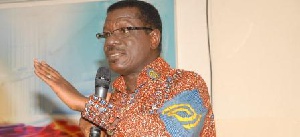- Home - News
- TWI News | TV
- Polls
- Year In Review
- News Archive
- Crime & Punishment
- Politics
- Regional
- Editorial
- Health
- Ghanaians Abroad
- Tabloid
- Africa
- Religion
- Election 2020
- Coronavirus
- News Videos | TV
- Photo Archives
- News Headlines
- Press Release
General News of Friday, 14 November 2014
Source: Daily Guide
Change your style – Otabil tells Mahama
Pastor Mensah Otabil, founder of International Central Gospel Church (ICGC), has observed that corruption could never be uprooted unless the leadership of the country changed their attitude and approach towards the fight.
“Leadership is a difficult task…it is hard, tough and lonely but it comes with a choice. This choice comes with responsibility. The President must start fighting corruption from his own house. You don’t start it attacking your enemies,” he charged.
He said when that was done, the President would be ‘misunderstood’ but, “if he hits himself, his government and his party, nobody can complain if he extends it everywhere.”
The ICGC founder was speaking at a heavily-attended forum on corruption organised by Occupy Ghana, a fast-growing pressure group, in collaboration with IMANI Ghana, a policy analysis think-tank, at the Parish Hall of Christ the King Catholic Church in Accra on Wednesday.
In what could be seen as an indirect critique of the government’s poor handling of reported rampant cases of corruption in the country, Pastor Otabil charged President John Mahama to “take up the challenge of fighting corruption.”
He said responsible leadership was what was needed to stem the tide of corruption.
“Citizens in every country are inherently corrupt. However, the only difference between the cases of corruption in Ghana and elsewhere is that over there the law works and anybody found to be corrupt is dealt with.
“A Ghanaian who urinates in public will not dare do that in say London, and this is not because he is a changed person, but it is because the laws work over there,” adding, “People religiously file their taxes elsewhere because they are afraid of the law. Until the law bites, corruption will never be eradicated,”
Lawyer Ace Ankomah, who set the tone at the forum, reviewed extensively the various statutes on corruption in the country and said, “You will fall in love in the fight against corruption if you read Ghanaian laws; but upon a careful assessment, you realise that these laws have never been applied.”
He continued, “I call this a paper tiger because the term refers to something that looks threatening but is actually ineffective”, adding, “In Ghana, the system has set you out to give out money.”
He announced that Occupy Ghana had given the Auditor General a 30-day ultimatum to recover all stolen and unaccounted monies documented in the Auditor’s various reports over the last eleven years, or be sued in court.
He said the notice had also been served on the presidency at the Flagstaff House as well as the Attorney-General and Minister of Justice.
Mr Ankomah said from the Attorney-General’s Department, the courts, Auditor-General, national security to immigration and police, everybody had turned a ‘blind eye’ to the laws whilst corruption was ‘festering’ in the country.
He complained bitterly about how corruption had been placed in the lowest category of offences in the statutes, and said that must change without delay.
He predicted doom for the Freedom of Information Bill, saying, “It will not have oxygen, the way it has been formulated, when passed into law.”
Dr Esi Ansah of Ashesi University, who tackled corruption in the private sector, called on activists to parry the political tag in the course of fighting corruption. She stressed, “We can’t afford to be silent anymore.”
She said the corruption battle had been mostly fought in the public sector and private entities were perpetrating crimes unnoticed, noting, “They buy the politicians and the media and get away with it.”
Manasseh Awuni Azure, a journalist with Joy FM, said naming and shaming people suspected to have indulged in corruption could also help to stem the tide.
Sydney Casely-Hayford, a leading member of Occupy Ghana, said the “stench of corruption is beginning to carry too far.”
He said the group is not a violent or partisan movement; neither is it working towards regime change. “We are only interested in ensuring that the right things are done for the country,” he pointed out.
George Andah, another member, said that “We have to help to make corruption unattractive in the country.”











